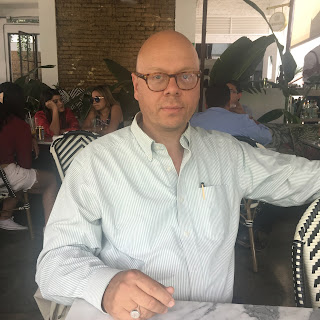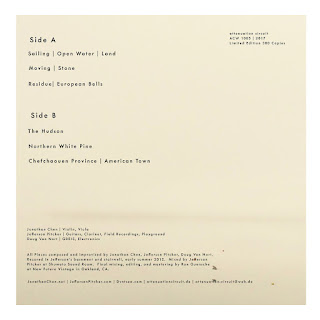Interview with Carl Abrahamsson
1. When we talk about the progress and the artist’s body of work, there is always a narrow margin where the inspiration comes into the scene? How that (un)godly particle worked in your early years?
Well, inspiration is something you can’t really neglect. It’s the spark that leads to the fire of creation. It goes beyond concepts like “motivation” and “drive.” In order to do anything beyond the merely causal and mundane, you need inspiration – a breath of fresh air. And the best way is simply to be aware and open-minded as you’re exposed to different kinds of input. I grew up in a cultured home and had lots of input. That meant I could freely orient myself and see what filled me with a resonance that could then be nurtured into pure inspiration. A lot of that came from negation, actually. Learning what you don’t like teaches you what you actually do like. I early on liked horror films on TV, and that seeped through because my parents liked them too and let me watch them. I liked comics in general, like most kids, but then gradually learnt where to get comics of a more refined kind. Later on, the same for music and books. I took it seriously and allowed myself to drift and explore, trusting my own intuition and inspiration. I’m still doing that.
2. Occulture has many definitions – how do you define it in your own work as a lecturer, musician, photographer, filmmaker, author and publisher?
Initially, it was the combination of the words: “occult” and “culture.” Genesis P-Orridge put them together in several brilliant analyses of contemporary culture. Over the decades it has become an egregore in itself: a tangible manifestation of a synthesis I believe is necessary for our survival. Basically, opening our minds and hearts and looking at what has worked before, in different cultural spheres, and as multidimensional solutions to current problems. I call this the “transition into the cultureal.” I think that in my own case, I’ve used it and developed it both consciously and unconsciously. Unconsciously in basically all expressions that aren’t strictly text-based: film, music, photography, etc. I can clearly see that I’ve woven in elements, methods, particles, themes, and so on that are decidedly “magical” without being strategic or consciously aware of it. But it’s only natural to me, as I’ve been involved in this kind of lifestyle for such a long time now. Consciously, I have very much used it to my own advantage, and hopefully also developed it. I have written and lectured about many aspects of occulture and the cultureal. It’s a fascinating subject dear to my heart & soul. I define it basically as manifestations of culture that to some degree contain the potential of inspiration and incentive via structures or seed that stem from an area or cultural sphere that has traditionally been called “occult.”
3. There is a certain aspect of what you are doing – I am thinking of personal stories of interesting personas like Brion Gysin or Genesis P-Orridge. It shows the spectrum of how the esoteric tradition was modified and moulded into a completely new paradigm influencing both contemporary occulture and to some extent pop culture. What brings you to those fascinating characters?
I have always been curious and networking. I’ve collected material and meetings, and I still like that a lot. That’s why I became a journalist early on, even with my own fanzines. I felt a need to “relay;” that is, to write about things and people that had affected me in some way – most often in beneficial ways. I have always contacted people who have interested me, and one thing always leads to another. Some turn out to be not so interesting, whereas others last a lifetime or more. In one sense it’s about information, but I would say that to an equal degree, my fascination has been about the phenomenon you asked about first: inspiration. I want to connect to the source of the inspiration I feel, and then move it all onwards.
4. Another interesting part is your music. How does it work with other parts of your work and could you tell a bit about the process, please?
I’m usually in a kind of Gesamt bubble, and it's a nice spot to be in. I put words to music I’ve made, or make a piece of music to go with a particular text or poem. A photograph becomes the record cover, and I may make a film to go with the piece in question. I like it when all of the exciting creations and/or possibilities are used together. I like music for many reasons. One of the main ones being that it’s an emotional sphere. It’s a pool I need to bathe in occasionally; otherwise I’m stuck in the intellect. Music is pure pleasure because it makes me experience and explore visionary strata. Whether it’s my own music or that of others, it has the capacity to move me in magical and evocative ways. A picture can do that too, of course, but it’s much easier to travel inside when you have your eyes closed and some emotionally evocative music in your ears.
5. We are talking about the work related to art, but how does the magickal process work for you in a daily life, both in practical and philosophical sense – in terms of transforming and understanding the tissue of reality?
I can’t say that I could distance myself from it, even if I wanted to. “It” being the magical process. It’s all-immersive, all-permeating, and has been for a long time. What that means is that my overall frame of reference in life is my own exploration of not only occulture as a singular, separate phenomenon, but also of a number of attitudes and approaches that could be labelled “occult” (in the traditional sense). Meaning, for instance, that I use meditation and various forms of daily rituals as positive, creative and health-inducing agents of balance and happiness. I’m also very interested in learning ever more about how these or similar approaches have been used in cultures and times other than my own. Hence I usually reply that I’m a “magico-anthropologist” when people ask what my profession is.
6. How does lecturing about esoteric knowledge work in academic environment in comparison to how it was before?
This is hard for me to answer because I haven’t done it in a couple of years. But I suspect it’s expanding; it seems to be. At least quantifiably, with more students, chairs, opportunities, publications, etc. It is certainly a great and fascinating area, but I fear that the academic psychology/method will turn it all into just another echo chamber in which their works simply reference works of a similar nature stemming from safe and expected/accepted sources. Academia is generally a quasi-autistic esoteric environment in itself, so I believe that academics studying “esotericism” will open some kind of psychic portal of absolute abstraction in which they will all disappear. They will probably not contextualize enough, but can probably do a good job archiving material.
7. Plans for the future?
More of the same, basically. I’m always working on many book projects at the same time. I hope to write four new books this year. This year, there will also be two new issues of The Fenris Wolf. I also plan to finish four films in my documentary series AN ART APART, and possibly another fictional feature film too. I have a new musical project with the great Joachim Nordwall, called “Mononom.” Our first album will be out this year, and I think I will make another solo album, too. I’m also always working together with my wife, Vanessa Sinclair, on many different projects so I’m sure this year will see some new music, books and films by us, too. But it basically always comes down to the writing. That’s what I love the most, and I feel totally blessed and blissed to be able to get up in the morning and just write.
Photographs: Vanessa Sinclair




Comments
Post a Comment